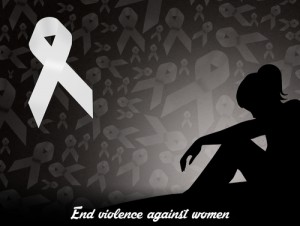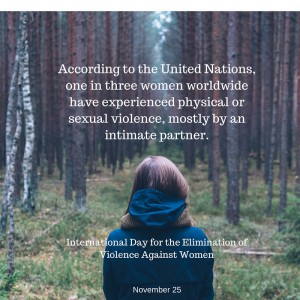International Day for the Elimination of Violence Against Women
A call for eradication of gender-based violence throughout the world
November 25th is International Day for the Elimination of Violence against Women. While violence, including domestic violence, affects men as well as women, gender-based violence affects women disproportionately. Much violence against women, domestic and otherwise, is rooted in long-standing and pervasive social structures that gave men control over women’s bodies and lives. In the United States, where educated and aware women and men have worked for decades to promote equality and eradicate the structures that support the legacy of violence against women, we sometimes lose sight of the fact that the problem still exists in this country, and that in many countries throughout the world, it remains rampant.
According to the United Nations, one in three women worldwide have experienced physical or sexual violence, mostly by an intimate partner. The U.N. expresses the following reasons for designation of this international day:
– Violence against women is a human rights violation.
– Violence against women is a consequence of discrimination against women, in law and also in practice, and of persisting inequalities between men and women.
– Violence against women impacts on, and impedes, progress in many areas, including – poverty eradication, combating HIV/AIDS, and peace and security.
– Violence against women and girls is not inevitable. Prevention is possible and essential.
– Violence against women continues to be a global pandemic.
In October we honored domestic violence month by addressing topics like same-sex domestic violence and male-directed domestic violence. Today we are touching upon two family law topics related to the legacy of gender-based domestic violence and other forms of violence against women: marital torts, and battered women’s syndrome.
Marital Torts
A “tort” is a wrongful act that injures another person and creates the basis for a civil lawsuit. Marital torts include ordinary civil wrongs between spouses as well as a few civil wrongs peculiar to marriage, such as fraudulent inducement to marry, dissipation of marital assets, or infection with an STD by one’s spouse.
Unfortunately our closest relationships can sometime bring out the worst in us. Torts involving physical violence are common in marriage. Marital rape is a wrong that often remains hidden due to shame or ignorance of the fact that raping one’s spouse is both a tort and a crime.
As with other types of gender-based violence, women are disproportionately affected by violent marital torts. Until recent decades, the legacy of gender subjugation did not permit an action for marital tort at all, because a wife’s legal identity was absorbed into her husband’s upon marriage—she ceased to exist as a separate entity. As the movement for women’s civil rights gained ground in the United States, this construct dissolved and courts across the country gradually began to permit suits between spouses.
Inter-spousal claims retain some unique features. In New Jersey, the “single controversy doctrine” requires a divorcing spouse to raise a marital tort claim (often called a “Tevis claim” after a leading New Jersey case) together with the divorce action. Depending on the circumstances, the court may resolve the claims together or may sever them and order the tort claim to be tried separately. This special treatment of Tevis claims acknowledges the fact that financial compensation for civil wrongs between divorcing spouses might have an impact on other financial responsibilities and distributions in a divorce action.
Battered Women’s Syndrome
“Battered women’s syndrome” is a mental disorder recognized as a sub-type of Post-Traumatic Stress Disorder (PTSD). Under certain circumstances it can be raised legally to support a defense of duress or a claim of self-defense in a criminal action. It is also an independent tort that can extend the relatively short time periods permitted to elapse before a victim loses a legal cause of action under a “statute of limitation” for a wrong such as assault and battery. In New Jersey, the tort of “battered women’s syndrome” recognizes that the emotional stress inherent in a cycle or process of domestic violence may interfere with the ability of a victim to address each wrong within otherwise appropriate time frames
A Call to all Men and Women, and Especially to Parents
There is a clear need for men and women alike to continue driving the impetus for change by raising awareness of the ongoing existence of gender-based violence both in the United States and throughout the world. We need to be vigilant in addressing ongoing issues as they come to light. The recent publicity regarding the widespread occurrence of crimes like acquaintance and date rape among young adults is one example. If you are a parent, especially a single or divorced parent who may be coping at least at times with the difficult task of trying to be both father and mother to your children, remind yourself that children need early, intensive, and ongoing education about the importance of treating their own bodies and the bodies of others with respect. Take some time on this International Day to reflect on the importance of your role, and to honor yourself for your efforts to fill that role.
Let’s all rise to the challenge.
If you need more information about marital torts, battered women’s syndrome, or domestic violence, contact us today for a confidential consultation.



